

Oxford University Presents the 550-Year-Old Gutenberg Bible in Spectacular, High-Res Detail. The great British empiricist Francis Bacon once remarked that Johannes Gutenberg’s printing press “changed the whole face and state of the world.”
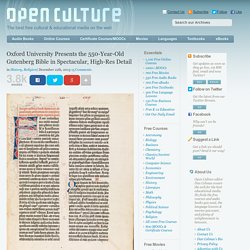
Although Gutenberg did not independently devise the press, he invented a mass-production process of moveable type and concocted an oil-based ink which, when combined with the wooden press, revolutionized the flow of information. Books could now be published in vast quantities, at only a fraction of the time required previously. For his first seminal printing, Gutenberg picked the Bible — an obvious choice for a Christian, and in retrospect, perhaps the only book whose historical significance rivals that of Gutenberg’s invention. Produced in 1454 or 1455, the few surviving copies of Gutenberg’s Bible remain exemplars of the printer’s forethought and craftsmanship; the page dimensions, it is believed, were devised by Gutenberg to echo the golden ratio of Greek aesthetics. The first page appears above. via Hyperallergic. 449-1066 Anglo-Saxon.
8th-11th Century BEOWULF, Unknown Author. 1066-1485 Medieval. 1485-1660 Renaissance. 1604 The Tragicall History of D. Faustus, Christopher Marlowe. 1564-1616 Shakespeare. 1660-1798 Neoclassical/Restoration. 1798-1832 Romantic. 1770-1850 William Wordsworth - Biography and Works. William Wordsworth (1770-1850), British poet, credited with ushering in the English Romantic Movement with the publication of Lyrical Ballads(1798) in collaboration with Samuel Taylor Coleridge.
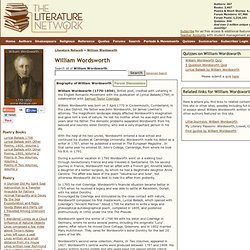
William Wordsworth was born on 7 April 1770 in Cockermouth, Cumberland, in the Lake District. His father was John Wordsworth, Sir James Lowther's attorney. The magnificent landscape deeply affected Wordsworth's imagination and gave him a love of nature. He lost his mother when he was eight and five years later his father. The domestic problems separated Wordsworth from his beloved and neurotic sister Dorothy, who was a very important person in his life.
With the help of his two uncles, Wordsworth entered a local school and continued his studies at Cambridge University. During a summer vacation in 1790 Wordsworth went on a walking tour through revolutionary France and also traveled in Switzerland. In 1795 he met Coleridge. 1757-1827 William Blake - Biography and Works. William Blake (1757-1827), English artist, mystic and poet wrote Songs of Innocence (1789): a poetry collection written from the child’s point of view, of innocent wonderment and spontaneity in natural settings which includes “Little Boy Lost”, “Little Boy Found” and “The Lamb”; Little lamb, who made thee?
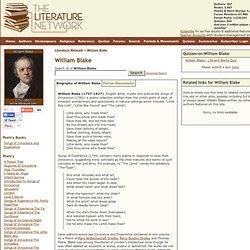
Dost thou know who made thee? Gave thee life, and bid thee feedBy the stream and o'er the mead;Gave thee clothing of delight,Softest clothing, woolly, bright;Gave thee such a tender voice,Making all the vales rejoice? 1759-1796 Complete Robert Burns. 1832-1900 Victorian. 1886 Dr. Jekyll and Mr. Hyde, Robert Louis Stevenson. Imagine a scientist who has concocted a potion.
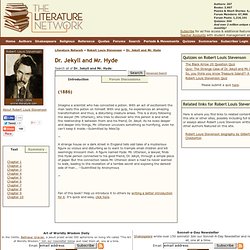
With an act of excitement the man tests this potion on himself. With one gulp, he experiences an amazing transformation and thus, a disturbing creature arises. This is a story following the lawyer (Mr. Utterson), who tries to discover who this person is and what the relationship it between them and his friend, Dr. Jekyll. 1843 A Christmas Carol, Charles Dickens. 1854- 1900 The Oscar Wilde Collection. 1809-1882 The Complete Work of Charles Darwin. 1900-1980 Modern/Post-Modern. 1899 Joseph Conrad, Heart of Darkness. The Project Gutenberg EBook of Heart of Darkness, by Joseph Conrad ******************************************************************* THERE IS AN HTML EDITION OF THIS TITLE WHICH MAY BE VIEWED AS EBOOK (#219) at ******************************************************************* This eBook is for the use of anyone anywhere at no cost and with almost no restrictions whatsoever.
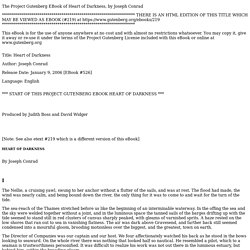
You may copy it, give it away or re-use it under the terms of the Project Gutenberg License included with this eBook or online at www.gutenberg.org Title: Heart of Darkness Author: Joseph Conrad Release Date: January 9, 2006 [EBook #526] Language: English Produced by Judith Boss and David Widger [Note: See also etext #219 which is a different version of this eBook] By Joseph Conrad. 1922 Ulysses, James Joyce. 1980-Present Contemporary. 1755 Dictionary, Dr Johnson. Samuel Johnson's 'Dictionary of the English Language' is one of the most famous dictionaries in history.
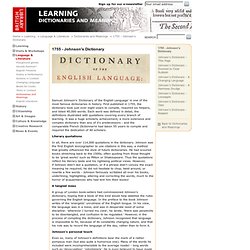
First published in 1755, the dictionary took just over eight years to compile, required six helpers, and listed 40,000 words. Each word was defined in detail, the definitions illustrated with quotations covering every branch of learning. It was a huge scholarly achievement, a more extensive and complex dictionary than any of it's predecessors - and the comparable French Dictionnarre had taken 55 years to compile and required the dedication of 40 scholars. Literary quotations In all, there are over 114,000 quotations in the dictionary. A tangled mess A group of London book-sellers had commissioned Johnson's dictionary, hoping that a book of this kind would help stabilise the rules governing the English language. Johnson's personal touch. 1719 The Life and Adventures of Robinson Crusoe, Daniel Defoe. 15th Century Le Morte D'Arthur, Syr Thomas Malory (Caxton) Geoffrey Chaucer (1342-1400) "The Canterbury Tales" (in middle english and modern english)
1066 Original folio of Domesday Book.